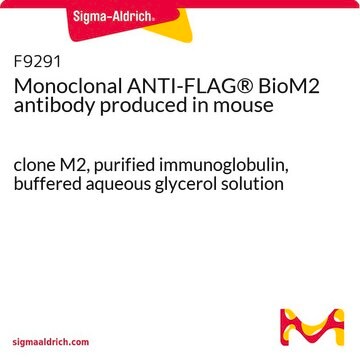Key Documents
F2922
Monoclonal Anti-FLAG® BioM5−Biotin antibody produced in mouse
clone M5, purified immunoglobulin, buffered aqueous solution
About This Item
Polecane produkty
pochodzenie biologiczne
mouse
białko sprzężone
biotin conjugate
forma przeciwciała
purified immunoglobulin
rodzaj przeciwciała
primary antibodies
klon
M5, monoclonal
Postać
buffered aqueous solution
metody
western blot (chemiluminescent): 2 μg/mL
izotyp
IgG1
Warunki transportu
dry ice
temp. przechowywania
−20°C
Opis ogólny
Zastosowanie
The product binds the FLAG peptide only when it is located at the amino terminus preceded by a methionine. Binding is not Ca2+-dependent. It is useful for detecting cytoplasmically expressed Met-FLAG® fusion proteins in mammalian crude cell extracts, but not recommended for fusion proteins expressed in E. coli.
It can be used for immunodetection methods using avidin- or streptavidin-conjugated reporter enzymes such as streptavidin-peroxidase. Primary antibody conjugates are preferred when using murine cells as the recombinant protein host.
Browse additional application references in our FLAG® Literature portal.
Cechy i korzyści
Postać fizyczna
Informacje prawne
Nie możesz znaleźć właściwego produktu?
Wypróbuj nasz Narzędzie selektora produktów.
Kod klasy składowania
12 - Non Combustible Liquids
Klasa zagrożenia wodnego (WGK)
WGK 3
Temperatura zapłonu (°F)
Not applicable
Temperatura zapłonu (°C)
Not applicable
Certyfikaty analizy (CoA)
Poszukaj Certyfikaty analizy (CoA), wpisując numer partii/serii produktów. Numery serii i partii można znaleźć na etykiecie produktu po słowach „seria” lub „partia”.
Masz już ten produkt?
Dokumenty związane z niedawno zakupionymi produktami zostały zamieszczone w Bibliotece dokumentów.
Nasz zespół naukowców ma doświadczenie we wszystkich obszarach badań, w tym w naukach przyrodniczych, materiałoznawstwie, syntezie chemicznej, chromatografii, analityce i wielu innych dziedzinach.
Skontaktuj się z zespołem ds. pomocy technicznej








